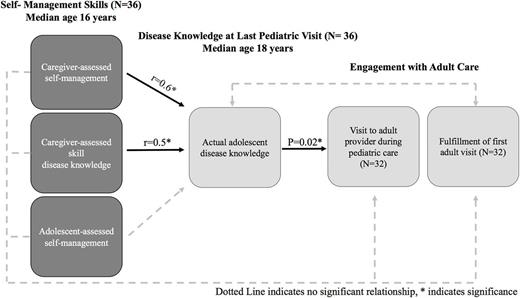Abstract
Introduction: The increased survivorship of children with sickle cell disease (SCD) into adulthood requires sufficient readiness to transition to adult healthcare. Transition readiness encompasses the necessary skills to successfully transition to adult healthcare, including self-care, decision-making (i.e., self-management), and self-advocacy. Disease education improves self-management in populations with chronic illnesses, but the relationship between disease knowledge and self-management in the adolescent SCD population during healthcare transition is unknown. We hypothesize that disease knowledge is associated with self-management and engagement in adult healthcare.
Methods: Adolescents with SCD and their caregivers completed a disease self-management skills checklist (SMSC) in early adolescence. The SMSC was modified from the validated Transition Readiness Assessment Questionnaire (J Pediatr Psychol. 2011 Mar; 36(2): 160-171.). The 21-item SMSC assesses perceived disease knowledge and self-management skills. At age 17, adolescents were invited to visit adult providers prior to leaving pediatric care (J Pediatr Health Care. 2012 Nov-Dec;26(6):e45-9.) At their last pediatric visit, adolescents completed the disease knowledge quiz, which tested their actual knowledge of SCD pathophysiology and complications. The disease knowledge quiz is a new instrument with 97% content validity as assessed by six pediatric and adult SCD experts. Association of SCD knowledge and perceived caregiver and adolescent self-management skills were evaluated by Pearson correlations if normally distributed; otherwise by Spearman correlation. Univariate linear regression tested associations between disease knowledge and SMSC. Univariate logistic regression tested associations between disease knowledge, visitation to adult provider, and completion of first adult visit.
Results: Thirty-six African-American adolescents (18 males; 18 females) with SCD and their caregivers completed the SMSC at a median age of 16 years and actual disease knowledge 2 years later at the last pediatric visit. Thirty-two visited adult care prior to leaving pediatrics and thirty-two completed the first adult visit. Predictors of actual adolescent knowledge immediately prior to leaving pediatrics were caregiver's early perception of their adolescent's self-management skills (Figure). Disease knowledge associated with higher likelihood of meeting adult providers during pediatric care (Figure). Neither self-management assessments nor disease knowledge associated with completion of first adult visit (Figure).
Conclusion: Caregivers are better evaluators of their adolescent's transition readiness than adolescent themselves, as demonstrated by a significant relationship between caregiver perceptions of their adolescent's self-management early in the transition process and adolescents' disease knowledge preceding departure for adult care. Adolescents' SCD knowledge level predicted future desire to engage in adult healthcare, demonstrated by the higher likelihood of visiting adult providers while in pediatric care. The lack of relationship between self-management and disease knowledge with completion of first adult visit indicates other possible barriers curtailing successful adult care transfer. Collectively, our findings support early engagement of caregivers in measuring adolescent transition readiness to guide subsequent transition programming in the SCD population.
Porter: NHLBI: Research Funding.
Author notes
Asterisk with author names denotes non-ASH members.


This feature is available to Subscribers Only
Sign In or Create an Account Close Modal